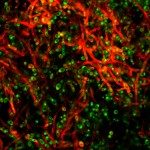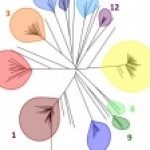Mélanie Legrand is a permanent scientist in the Fungal Biology and Pathogenicity Unit. Mélanie Legrand has gained her Master degree at the University of Minnesota working on mating in the human fungal pathogens Candida albicans and Candida dubliniensis in the laboratory of Prof. Paul Magee. She has completed her PhD degree working on DNA repair in Candida albicans with Dr. David Kirkpatrick at the University of Minnesota. She joined the Unit of Fungal Biology and Pathogenicity Unit headed by Prof. Christophe d’Enfert at the Institut Pasteur to study the molecular mechanisms involved in maintenance of genome integrity in Candida albicans. She obtained a permanent INRA position in 2010.
She is interested in Candida albicans‘ general biology, genome dynamics and mating. Presently, she is leading a project on the identification of regulators of « Loss of Heterozygosity » in C. albicans. She also contributes to the C. albicans ORFeome project.
Click to view graph
Connections
Click to view timeline
Timeline
Projects
Publications
Download-
2024Metabolic reprogramming during Candida albicans planktonic-biofilm transition is modulated by the transcription factors Zcf15 and Zcf26., PLoS Biol 2024 Jun; 22(6): e3002693.
-
2023The pathogenic and colonization potential of Candida africana., Microbes Infect 2023 Sep; (): 105230.
-
2022A phylogenetically-restricted essential cell cycle progression factor in the human pathogen Candida albicans., Nat Commun 2022 Jul; 13(1): 4256.
-
2022Multiple Stochastic Parameters Influence Genome Dynamics in a Heterozygous Diploid Eukaryotic Model., J Fungi (Basel) 2022 Jun; 8(7): .
-
2021Factors that influence bidirectional long-tract homozygosis due to double-strand break repair in Candida albicans., Genetics 2021 Mar; (): .
-
2020The impact of the Fungus-Host-Microbiota interplay upon Candida albicans infections: current knowledge and new perspectives., FEMS Microbiol Rev 2020 Nov; (): .
-
2020Use of CRISPR-Cas9 To Target Homologous Recombination Limits Transformation-Induced Genomic Changes in Candida albicans., mSphere 2020 09; 5(5): .
-
2020Identification and Characterization of Mediators of Fluconazole Tolerance in Candida albicans., Front Microbiol 2020 ; 11(): 591140.
-
2019Candida albicans: An Emerging Yeast Model to Study Eukaryotic Genome Plasticity, Trends Genet. 2019 Apr;35(4):292-307.
-
2019Identification of Recessive Lethal Alleles in the Diploid Genome of a Candida albicans Laboratory Strain Unveils a Potential Role of Repetitive Sequences in Buffering Their Deleterious Impact, mSphere 2019 02;4(1).
-
+View full list of publications


